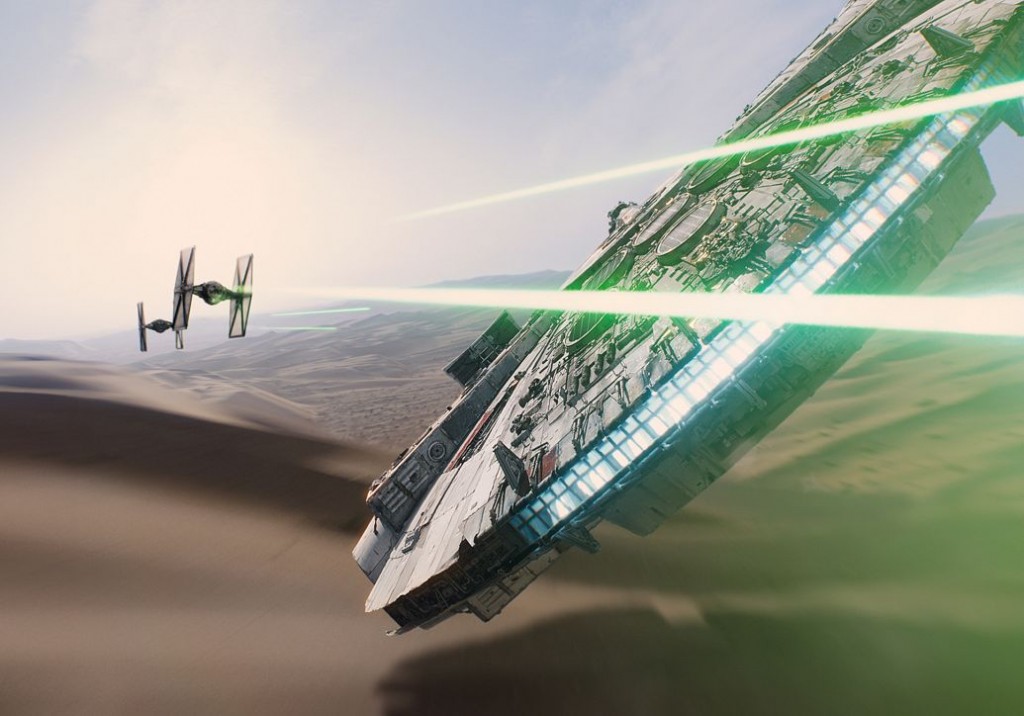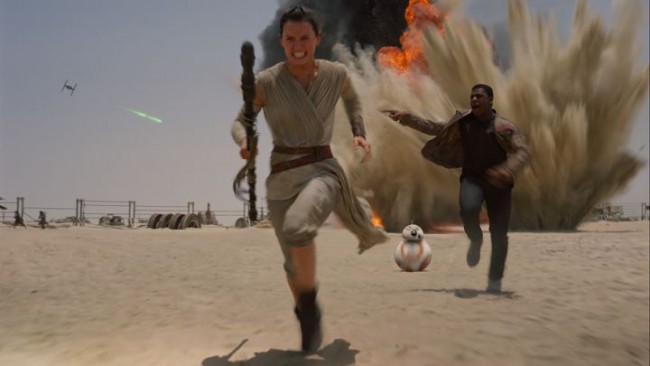
Continuing one of the biggest film franchises of all time is no easy task. With Star Wars: The Force Awakens, you can feel the pressure J.J. Abrams and company must have been under. Questions have lingered since the film was announced: Can a new set of writers and a new director really take over for George Lucas? Is a story not just inherently the author’s? Can it legitimately be bought and sold and continued? Now that the movie is released, we can attempt to explore these questions.
Star Wars: The Force Awakens is a happy fairytale — a children’s story. For a moment the series took a serious turn: in the prequels, we watched Anakin Skywalker get slowly corrupted by a seemingly benevolent republic turning into an evil Empire, for what seemed like good reasons. (American social commentary anyone? Anyone?) But, The Force Awakens is back strongly in the world of the fairytale, close to the same world as the original Star Wars trilogy, though perhaps even more fantastical.
So if our main characters are wide-eyed, honest, and innocent, it fits. If they keep asking obvious questions to authority figures, it’s because they’re stand-ins for kids in the fable, trying to make sense of this world. Maybe nothing in our grown-up worlds is as black and white, as good versus evil, as this new Star Wars universe, but the world of a child, sheltered by caring parents, may well be that morally simple. It’s all supposed to be fun: we know the good guys will win, the bad guys will lose, and that the galaxy will be better off at the end of it all.
So how do you judge a movie that’s supposed to be a fable? It’s not by questioning how a fuel pump could be installed on a hyperdrive; nor by asking how Finn, an ex-stormtrooper, could have learned social skills and myths about Han Solo when he was, “programmed from birth to kill;” nor by noting that Adam Driver’s Kylo Ren looks like a young Severus Snape. It’s certainly not by being horrified at the mass killings of billions of people and trillions of species as several planets burn and explode before our eyes. You judge the movie by looking at how J. J. Abrams evoked this epic world, where his fantasy shines, and where it begins to look thin.
The Force Awakens has an epic, universe-jeopardizing plot, like most of the old Star Wars movies. The action is the backdrop for discovering our heroes, watching them bond, and figuring out with them what is good and what is bad.
There’s Rey (Daisy Ridley), displaying telltale characteristics of a high Midichlorian count and Jedi potential (just like A New Hope’s Luke and The Phantom Menace’s Anakin). She’s full of mechanical savvy and an amazing pilot; she even has a desert planet toga. (Additionally, she’s adorable, but whether that is Force-related is uncertain.)
There’s Finn (John Boyega), FN-2187 in his previous stormtrooper life, but now he’s good and funny and innocent and loyal. Somehow he snapped out of his stormtrooper training and emerged fresh-faced and warm-hearted.
Then there’s Poe Dameron (Oscar Isaac), the Resistance’s top pilot, complete with orange and white padded flight suit. He’s fast-talking, agreeable, and funny. He’s not completely a main character, but he’s new and has potential.
If I were to be cynical, I would hate that these new characters have no backstories. Okay, Finn was a stormtrooper, Rey’s past, we can tell, is going to be a surprise, and Poe, he’s a Resistance pilot. But that’s it. Their histories are flimsy; they don’t bring any pre-existing relationships into the movie. Even farm boy Luke had an uncle.
Still, looking beyond their empty pasts, each character is strong within the film, all tying into the film’s playful tone. Rey, Finn, and Poe spit snappy, earnest dialogue, exuding a light-hearted innocence which makes the fantasy around them come alive. Even baddie Kylo Ren has a certain innocent childlikeness to him: he throws temper tantrums, slashing up rooms with his lightsaber; he complains to his master; he wears a crazy mask just ‘cause it’s cool (or because he wants to sound like Bane from The Dark Knight Rises). Thus, the central conflict of the film, interestingly, becomes a clash between childish malevolence and childish nobility.

Yet, while The Force Awakens is a cheerful space opera, it, by sheer existing, is more than that – it’s Star Wars! Chewie and Han Solo stride aboard the Millennium Falcon, and the theater claps. Luke Skywalker lifts off his Jedi hood, and everyone gasps. Even our new heroes are awed to be in the presence of the fabled Han Solo, or to be looking for the real Luke Skywalker. However, by tying this film so deeply to what came before, we start to see the deficiencies of the new story in comparison.
There is a certain seriousness, a nobility, in the original Star Wars trilogy. We get the sense that those original characters were fighting for something important. Though their story is sheltered in a way, with good and evil made very clear, and stormtroopers made very easy to kill, there is more emotional reality to it. In A New Hope, when the planet Alderaan is destroyed, we see how devastated Princess Leia is; we know she just lost everything, everyone she cared about, her whole home world. Obi-wan too is shaken to the point of needing to sit down, just from sensing the planet’s loss with the Force. In The Force Awakens, something like three planets are destroyed in as many seconds, and no one is that upset. It isn’t as personal. By not feeling as serious as the previous Star Wars movies, The Force Awakens is hurt by a lack of depth. It’s child-like sensibilities make the movie charming and fun, but it also makes the story a little too easy.
Still, for what it is, it is good. All of those callbacks that welcome unwanted comparisons to the original trilogy–Han and Chewbacca, Leia and Luke, the Millennium Falcon and X-Wings, lightsabers and the Force–also help place us back in a universe so beloved to many of us. It also welcomes back a message that was in the original Star Wars movies, but that is central to The Force Awakens: the value of friendship.
Each of the characters enters the movie without a community, but they leave with one. Our heroes risk everything to save each other–quite literally the fate of the whole galaxy. It might seem dumb, but it’s definitely noble. When we see them all together near the end, we know what the heart of the story is: the friendships between these new heroes, under the guidance of the older generation. Sure, there is a lot of wanton, beautifully computer-generated mayhem, but above it all, and making it all enjoyable, are the bonds between our new characters.
And that–character above all else–is what made the original Star Wars trilogy so special. It’s what makes it possible to believe that, while it might be going for something new and not succeeding in ways past films in the franchise have, The Force Awakens is the next chapter in that world. And the movie is undoubtedly compelling enough to make believing in it worthwhile.
Photos courtesy of here
